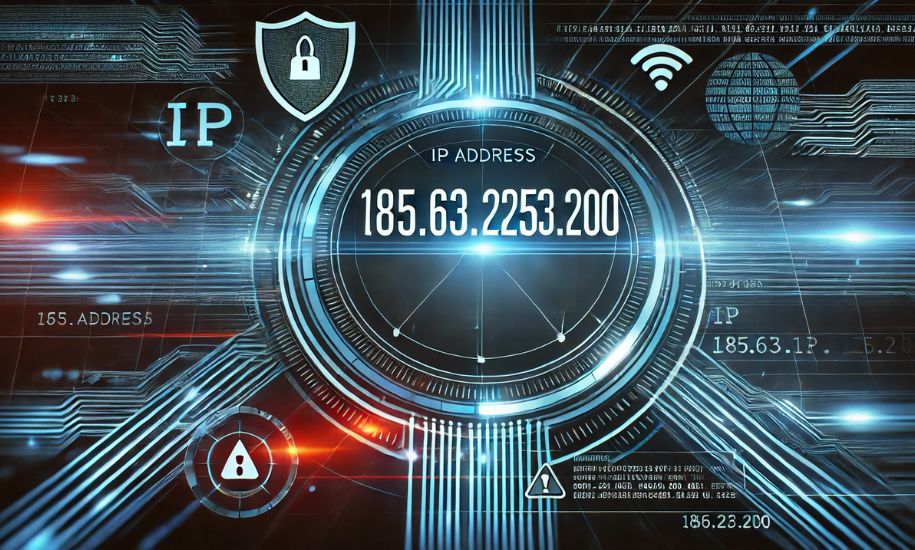In the digital age, IP addresses play a crucial role in connecting devices to the internet. Every website, server, and device that goes online operates using an IP (Internet Protocol) address. However, not all sequences of numbers that appear to be IP addresses are valid. One such example is 185.63.2253.200, which does not conform to the standard IPv4 or IPv6 format. This article explores what an IP address is, common mistakes in formatting, cybersecurity concerns, and how incorrect IP addresses like 185.63.2253.200 can affect network security and troubleshooting.
What is an IP Address?
An IP address is a numerical label assigned to each device connected to a network that uses the Internet Protocol for communication. There are two main versions of IP addresses:
- IPv4 (Internet Protocol version 4): Consists of four octets (numbers between 0-255) separated by dots, such as 192.168.1.1.
- IPv6 (Internet Protocol version 6): A more advanced format consisting of eight groups of hexadecimal numbers, designed to accommodate the growing number of internet-connected devices.
Why 185.63.2253.200 is an Invalid IP Address
At first glance, 185.63.2253.200 seems like an IPv4 address, but it contains an error. The maximum value for each section (octet) of an IPv4 address is 255. Since 2253 exceeds this limit, it cannot be a valid IPv4 address.
Common reasons why an IP address might be miswritten include:
- Typographical errors: A simple mistake in entering an address manually.
- Misconfiguration: Incorrectly assigned addresses in network settings.
- Misunderstanding IP formatting: Some users may be unaware of the numerical limits.
Cybersecurity Risks of Incorrect IP Addresses
Although 185.63.2253.200 is not a valid IP address, mistyped IPs can still lead to cybersecurity risks. Here are some potential dangers:
1. Phishing Attacks
Attackers often use misleading IP addresses to trick users into visiting fraudulent websites. A mistyped or seemingly unfamiliar IP might direct users to a malicious domain instead of the intended one.
2. DNS Spoofing
Hackers can manipulate DNS (Domain Name System) settings to reroute users to fake websites. If users incorrectly enter an IP like 185.63.2253.200, they could be led to a compromised site.
3. Firewall Configuration Issues
Network administrators use IP addresses to configure firewalls and access control lists (ACLs). A misconfigured firewall rule using an invalid IP could inadvertently allow unauthorized access to sensitive systems.
The Role of IP Addressing in Network Troubleshooting
Understanding IP addressing is essential for diagnosing and resolving network issues. Here are some ways incorrect IP addresses impact network troubleshooting:
- Connection Failures: Devices may fail to communicate if assigned an invalid or improperly formatted IP address.
- Routing Problems: Incorrectly configured IP addresses can cause routing loops or black holes, where data packets never reach their destination.
- Access Denied Errors: Network restrictions based on IP addresses might block access if the address does not match the expected format.
How to Identify and Correct IP Address Errors
To avoid issues like those mentioned above, it is important to verify IP addresses carefully. Here are some steps to ensure proper IP usage:
- Use Online IP Validators
- Websites and tools like “IP Checker” can validate whether an IP address is formatted correctly.
- Check Router and Server Logs
- Reviewing logs can help identify misconfigured IP addresses that may be causing connection problems.
- Configure DHCP Correctly
- DHCP (Dynamic Host Configuration Protocol) automatically assigns correct IP addresses to devices. Ensuring proper DHCP settings can prevent mistakes.
The Impact of Incorrect IPs in Web Hosting and SEO
For website owners, mistyped IP addresses can have SEO and hosting consequences:
- Server Misconfiguration: Hosting providers rely on correct IPs to link domains to web servers. Incorrect entries can result in downtime.
- SEO Penalties: Search engines might flag a site as suspicious if it is linked to incorrect or non-existent IPs.
- Broken Links: A mistyped IP in a website’s DNS settings can cause broken links and poor user experience.
Conclusion
While 185.63.2253.200 may seem like a standard IP address at first glance, it is invalid due to incorrect formatting. Understanding how IP addresses work, their correct structure, and the cybersecurity risks associated with incorrect usage is essential for both individuals and businesses. By ensuring proper configuration and verification, users can avoid network errors, security threats, and website issues.
For more insightful discussions on networking, cybersecurity, and technology, visit Digi fanzine.
